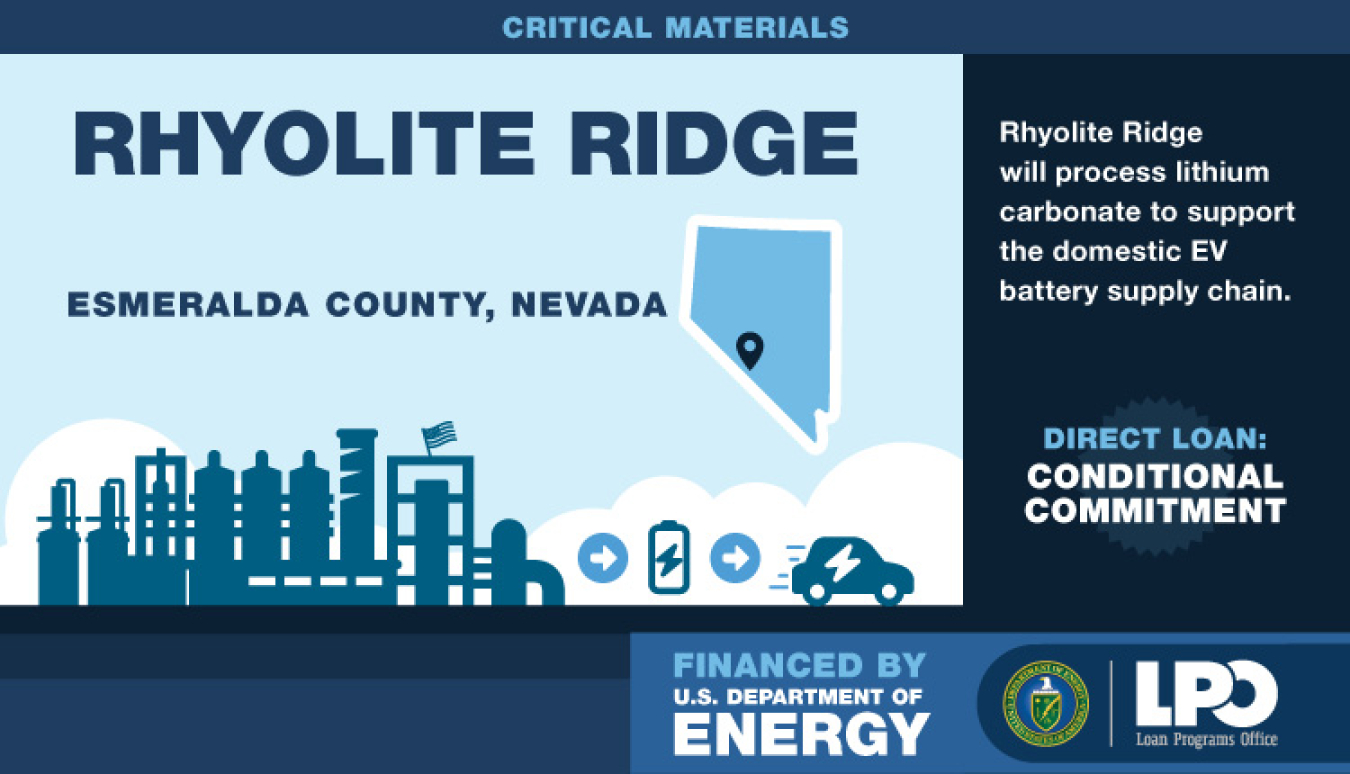DOE's Loan Programs Office (LPO) has offered a conditional commitment to lend up to $700 million to Ioneer Rhyolite Ridge LLC to develop a domestic supply of lithium carbonate for electric vehicle (EV) batteries in Esmeralda County, NV
Office of Energy Dominance Financing
January 13, 2023
The U.S. Department of Energy’s (DOE) Loan Programs Office (LPO) has offered a conditional commitment to lend up to $700 million to Ioneer Rhyolite Ridge LLC to develop a domestic supply of lithium carbonate for electric vehicle (EV) batteries from the Rhyolite Ridge Lithium-Boron Project (Rhyolite Ridge) in Esmeralda County, Nevada. The project is being developed by ioneer ltd (Ioneer). If finalized, LPO’s loan to the Rhyolite Ridge project would finance the on-site processing of lithium carbonate that could potentially support production of lithium for approximately 370,000 EVs each year. This project could reduce annual gasoline consumption by nearly 145 million gallons, and prevent the release of 1.29 million tons of carbon dioxide each year. The Rhyolite Ridge project is projected to create up to 600 construction jobs and approximately 250-300 operations jobs. LPO works with all borrowers to create good-paying jobs with strong labor standards during construction, operations, and throughout the life of the loan and to adhere to a strong Community Benefits Plan.
Ioneer entered into a purchase agreement in September 2021 with Sibanye Stillwater Limited (Sibanye-Stillwater), a mining and metals processing company, to establish, subject to certain conditions, a joint venture related to the Rhyolite Ridge project. Sibanye-Stillwater is a valued interested party and expected partner in the project.
The conditional commitment comes on the heels of two critical materials loans closed by LPO — Syrah Vidalia, which will process active anode material, and Ultium Cells, which will manufacture battery cells. These projects marked LPO’s first-ever loans in the critical materials sector and the most recent loans under Advanced Technology Vehicles Manufacturing (ATVM) Loan Program within the last decade.
Together, these projects support a broader commitment by the Biden-Harris Administration to strengthen the nation’s domestic battery supply chain and electrify the transportation sector to reduce our reliance on fossil fuels and foreign supply of raw materials. This year alone, the Biden-Harris Administration awarded $2.8 billion in funding to supercharge battery-related mining, processing, and manufacturing in the United States, and an additional $74 million in funding to advance domestic battery reuse and recycling.
The urgency to secure critical materials for batteries is expected to rapidly increase in the coming years as demand for lithium is projected to exceed current global production by 2030. This is subsequently causing U.S. auto manufacturers to seek a robust domestic supply of critical materials to keep pace with the increased demand.
The Rhyolite Ridge project has executed offtake agreements with Ford, Prime Planet Energy & Solutions (a joint venture battery company between Toyota Motor Corporation and Panasonic Corporation), and EcoPro Innovation (the world's second largest lithium nickel-cobalt-aluminum oxide cathode materials manufacturer and a major cathode supplier for global battery manufacturers), with contracts ranging from three to five years.
While Asia currently dominates the lithium carbonate refining process, the Rhyolite Ridge deposit is one of two known sizeable lithium-boron deposits in the world and is expected to be the second lithium mine in the United States. LPO expects the project to further develop a socially and environmentally responsible U.S. supply chain for lithium.
- The project will provide a single, fully auditable environmental, social, and governance (ESG) chain of custody back to the source, increasing the availability of critical minerals in the United States and reducing U.S. dependency on foreign supply sources.
- Rhyolite Ridge is working to minimize impact to Tiehm’s buckwheat, a plant species listed as Endangered by the U.S. Fish and Wildlife Service that is endemic to Esmeralda County, Nevada. The project has already invested $1.2 million on research to preserve the plant and has revised its entire Mine Plan of Operations to avoid all direct impacts to the plant. The Bureau of Land Management (BLM) will formally consult with the U.S. Fish and Wildlife Service to assess the potential impacts of the project on Tiehm’s buckwheat, and is also preparing an Environmental Impact Statement pursuant to the National Environmental Policy Act (NEPA). LPO issuance of the loan is contingent on Rhyolite Ridge’s completion of NEPA and commitment to allowing LPO to monitor the site.
- Rhyolite Ridge is committed to implementing the Mining Association of Canada’s Towards Sustainable Mining (TSM) standard. TSM is a globally recognized sustainability program that supports mining companies in managing key environmental and social risks.
- Rhyolite Ridge has met with state officials, community members, and tribes to discuss ways to address issues including water use, truck access, housing for workers, balancing growth with community interests, and regional transportation.
- It is anticipated that three bands of the Shoshone Tribe will be participating in formal consultations with the BLM regarding the project. In addition to the formal consultation process, Rhyolite Ridge has been making direct outreach with tribes to understand any cultural resource areas and environmental concerns, to explore opportunities for economic development, to provide job training, and to identify initiatives for tribes to participate in the clean energy economy.
- Rhyolite Ridge is committed to hiring locally and offering training opportunities, including funding higher education scholarships for local high school students and residents in various technical and managerial fields.
- The Rhyolite Ridge project is expected to operate for 26 years, after which the project will be decommissioned and the land reclaimed and revegetated.
Developing a U.S. supply chain for these materials is a national priority as the country works toward energy independence. Earlier this year, the DOE announced a comprehensive strategy to secure America’s clean energy supply chain. A core focus within the strategy is increasing the availability of the critical materials that are essential components of the clean energy technologies necessary for reaching national climate and economic goals.
Onshoring the critical materials supply chain is an important step toward energy independence, lower costs for American consumers, and protection from global supply bottlenecks. While this conditional commitment demonstrates LPO’s intent to finance the project, a final loan is contingent on the project meeting numerous conditions related to environmental review, finances, and technical due diligence.
Learn more about LPO’s critical materials projects.


